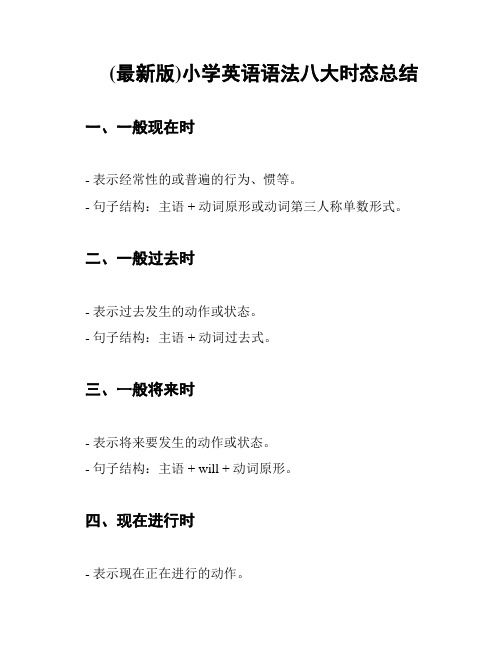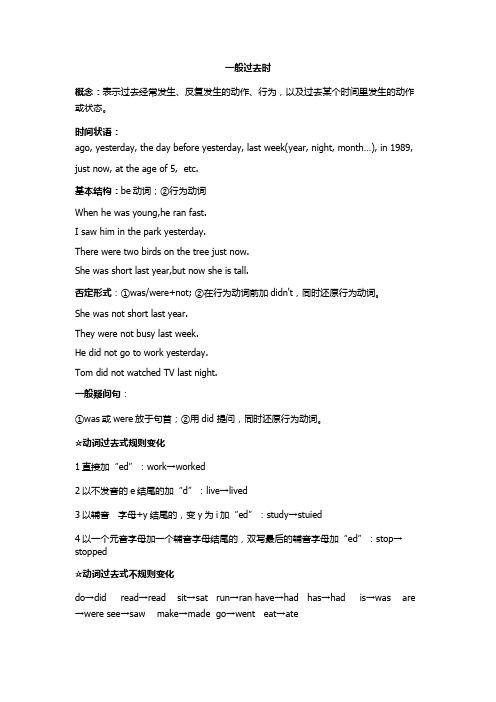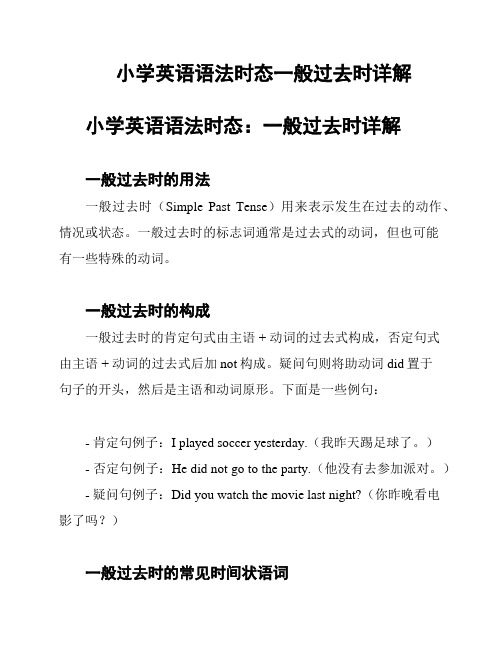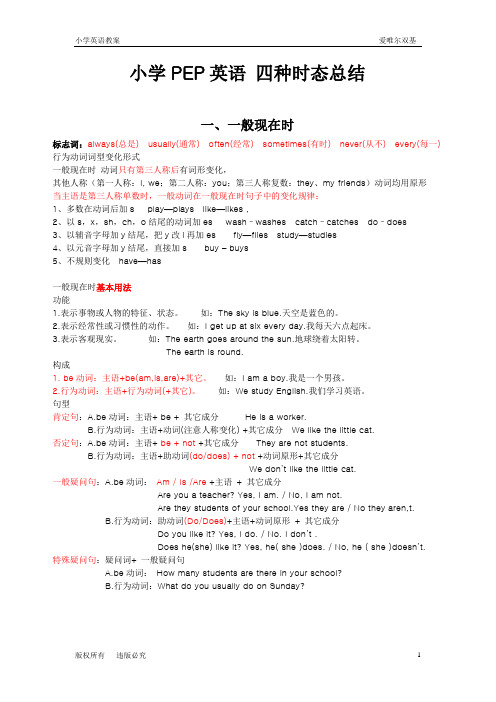完整小学英语一般过去时总结
(最新版)小学英语语法八大时态总结

(最新版)小学英语语法八大时态总结一、一般现在时
- 表示经常性的或普遍的行为、惯等。
- 句子结构:主语 + 动词原形或动词第三人称单数形式。
二、一般过去时
- 表示过去发生的动作或状态。
- 句子结构:主语 + 动词过去式。
三、一般将来时
- 表示将来要发生的动作或状态。
- 句子结构:主语 + will + 动词原形。
四、现在进行时
- 表示现在正在进行的动作。
- 句子结构:主语 + am/is/are + 动词-ing。
五、过去进行时
- 表示过去某个时间正在进行的动作。
- 句子结构:主语 + was/were + 动词-ing。
六、将来进行时
- 表示将来某个时间正在进行的动作。
- 句子结构:主语 + will be + 动词-ing。
七、现在完成时
- 表示过去发生但与现在有关的动作或经历。
- 句子结构:主语 + have/has + 动词过去分词。
八、过去完成时
- 表示过去某个时间之前已经发生的动作。
- 句子结构:主语 + had + 动词过去分词。
以上是小学英语语法八大时态的总结,希望能对同学们的研究有所帮助。
小学英语一般过去时

4: Tom theywent
football now, but basketball just now.(play)
5: we played (go) to the zoo yesterday.
6: She night.
(play)the violin last
We _______w__e(gnot) to the zoo yesterday.
ate
工作范文,仅供参考!
如需使用,请下载后根据自己的实际情况,更改后使用!
eat say see drink win
ate said saw drank won
用括号内所给的单词的适当形式填空。
1:I watched (watch)a football game yestwerilldgayo.
2: wme ade
(go) to school tomorrow.
3: I is playing (make) a cake lastpwlaeyeekd.
常与一般过去时连用的时间状语:
规则动词的过去式变化如下: 1、一般情况下,动词词尾加 -ed ,如:
watch ---watched play---played
2、以不发音的 -e 结尾动词,动词词尾加 -d, 如:
live---lived hope---hoped
3、以辅音字母 + y结尾的动词,把-y变为-i 再加-ed,如:
1、一般在动词末尾加– ed
look play start
looked played started
2、以不发音的 -e 结尾动词,动词 词尾加 -- d
live
lived
hope
hoped
小学英语一般过去时总结_1

一般过去时A.结构① be动词(is,am, are)→ was/were主语+ 谓语②实义动词→相应的动词过去式①表示过去的事实或状态。
例:He was very busy an hour ago.他在过去的一小时非常忙碌。
I was eight years old last year. 我去年8岁。
②表示在过去某个时间内所作的事情,常和表示过去的时间状语连用。
例:She bought many books yesterday .昨天她买了很多书。
I played table tennis with my friend last Monday.上周一我和一个朋友打了乒乓球。
表示过去的时间状语,有:yesterday,last week,last year,two days ago,...B.动词的过去式动词有规则动词和不规则动词之分。
规则动词的过去式都是以-ed结尾,而不规则动词的过去式是没有规则。
①一般情况下,在动词原形后直接加ed。
如:wanted,played。
②以不发音的字母e结尾的动词,直接加d。
如:hoped,lived。
③重读闭音节单词需双写最后一个辅音字母,再加ed。
如:stopped, shipped。
④以辅音字母+y结尾的动词变y为i,再加ed。
如:studied,worried。
⑤有些动词不符合上面的规则,需要特殊记忆。
如:am(is)-was, are-were, go-went, eat-ate,swim-swam, buy-bought, see-saw, lose-lostteach-taught, bring-brought, think-thought,fall-fell, hurt-hurt, break-broke, win-won,单词词意一般过去时aagree 同意agreed ask 问asked answer 回答answeredb become 成为became begin 开始began bring 带来brought buy 买boughtccall 呼叫called carry 搬运carried catch 抓住caught check 检查checked clean 清洁cleaned climb 爬climbed come 来came cook 煮cooked cut 切cutd dance 跳舞danced do 做did draw 画drew drink 喝drank drive 驾驶droveeeat 吃ate enjoy 欣赏enjoyedffeel 感觉felt fly 飞flied forget 忘记forgot fish 钓鱼fishedgget 得到got give 给gave go 去went grow 成长grewh have 有had hear 听到heard help 帮助helpedj jump 跳jumpedk keep 保存kept know 知道knewl learn 学习learnedlisten 听listened like 喜欢liked look 看looked live 生活lived love 喜爱lovedm make 做made meet 遇见met move 移动movedn need 需要needed o open 打开openedppaint 画painted pick 摘picked play 玩played plan 计划planned practise 练习practised prefer 更喜欢preferred put 放putr read 读read ride 骑rode run 跑ranssay 说said see 看saw sit 坐sat skip 跳skipped speak 说spoke start 开始started stay 停留stayed sweep 扫swept study 学习studied swim 游泳swamttalk 谈话talked take 带去took teach 教taught thank 谢谢thanked tell 告诉told think 想thought travel 旅游traveled try 试triedu use 使用used w wake 醒来woke。
一般过去时的总结归纳

稿子一嘿,亲爱的小伙伴们!今天咱们来聊聊一般过去时呀。
一般过去时呢,就是用来讲过去发生的事情哒。
比如说,“我昨天吃了一个大蛋糕”,这里“吃”这个动作发生在昨天,所以就要用一般过去时,eat 就得变成 ate 。
咱们想想哦,平时咱们说“我小时候喜欢玩泥巴”,“小时候”就是过去的时间,“喜欢”就得变成 liked 。
还有哦,如果句子里有表示过去的时间状语,像 yesterday(昨天)、last week(上周)、two days ago(两天前)等等,那动词大多都得变成过去式呢。
举个例子,“He went to Beijing last month.” 上个月他去北京啦,went 就是 go 的过去式。
再比如说,“They were happy yesterday.” 昨天他们很开心,这里 were 就是 are 的过去式。
哎呀呀,一般过去时是不是还挺有趣的?多练习练习,咱们就能熟练掌握啦!稿子二嗨嗨,朋友们!咱们接着唠唠一般过去时哈。
一般过去时呀,就像是我们回忆过去的小魔法。
比如说,“我早上起晚了”,如果这是昨天早上发生的事,那“起”就得变成“got up”。
想想看哦,“她买了一条漂亮的裙子”,“买”在过去发生,就要用 bought ,而不是 buy 。
还有那种否定句,“我昨天没做作业”,那就是“I didn't do my homework yesterday.” 这里用 didn't 来表示否定。
一般疑问句也有讲究哦,“你昨天去公园了吗?”就是“Did you go to the park yesterday?” 得用 did 来帮忙提问。
而且哦,有些动词的过去式不是直接加 ed 那么简单的。
像“see”变成“saw”,“fly”变成“flew”,是不是有点特别?呢,一般过去时能让我们把过去的精彩故事讲得清清楚楚。
多练练,咱们就能在过去的时光里畅游无阻啦!。
小学英语语法:一般过去时语法讲解

含有 be 动词的句型 三.一般现在时和一般过去时句型结构的异与同
I was a teacher last year. She(He) was a singer. We You were happy. They
疑问词+did(was/were)+主语+动词原形+其它?
做题了,看看谁最棒?
1. 连词成句
1. did, what, you, yesterday, do. ____________________________________ 2. watch, John, did, TV, weekend, last. ____________________________________ 3. went, I ,to, by, park, a, bike ____________________________________ 4. jumped, the, into, lake, he, and, the, to, swam, kite. ___________________________________
What did you do yesterday ?
John did watch TV last weekend.
study studied carry carried
let→let 让 put→put 放下 cut → cut 砍,剪 cost →cost花钱 read→read读书 hurt → hurt受伤
6 ——aught是关: catch→caught抓 teach→taught教学
小学英语语法一般过去时总结及练习

一般过去时概念:表示过去经常发生、反复发生的动作、行为,以及过去某个时间里发生的动作或状态。
时间状语:ago, yesterday, the day before yesterday, last week(year, night, month…), in 1989, just now, at the age of 5, etc.基本结构:be动词;②行为动词When he was young,he ran fast.I saw him in the park yesterday.There were two birds on the tree just now.She was short last year,but now she is tall.否定形式:①was/were+not; ②在行为动词前加didn't,同时还原行为动词。
She was not short last year.They were not busy last week.He did not go to work yesterday.Tom did not watched TV last night.一般疑问句:①was或were放于句首;②用did 提问,同时还原行为动词。
☆动词过去式规则变化1直接加“ed”:work→worked2以不发音的e结尾的加“d”:live→lived3以辅音字母+y结尾的,变y为i加“ed”:study→stuied4以一个元音字母加一个辅音字母结尾的,双写最后的辅音字母加“ed”:stop→stopped☆动词过去式不规则变化do→did read→read sit→sat run→ran have→had has→had is→was are →were see→saw make→made go→went eat→ate一般过去时的练习一、用所给的动词的适当形式填空。
⒈He ___________(visit) the Great Wall last year.2.We____________(have) a good time yesterday.3.We often __________(go) to school by bus last year.4.I __________(live)in the village when I was a child.5.Mike__________(see) a big tiger in the nature park last year.6.Sam___________ (do) the housework yesterday.7.________(do) you _________(enjoy) yourself yesterday?8.________(do)you __________(play) the violin in the artroom yesterday?9.I __________ (eat) a big pizza yesterday.10.There_________ (be) many sheep on the farm last year.11. I _________ (watch) a cartoon on Saturday.12. Her father __________ (read) a newspaper last night.13. We _________ to zoo yesterday, we ___________ to the park. (go)14. _________ you __________ (visit) your relatives last Spring Festival?15. _________ he __________ (fly) a kite on Sunday? Yes, he __________.二、单项选择( ) 1. She watered the flowers ________.A tomorrowB sometimesC yesterday morning( ) 2.What ____ Mike do last weekend ?A doB doesC did( ) 3. I ___ my room last Sunday.A cleanedB cleanC am cleaning( ) 4. _____ you _____ TV last night .A Do, watchB Did, watchC Did, watched( ) 5.---Did your father write an e-mail yesterday ?A Yes, he did.B Yes, he doesC No, he don’t( ) 6.They _____ on a trip in February ,2007.A are goingB goingC went( ) 7. ____ he ____ football two days ago?A Does , playB Did , playedC Did , play三、Be动词的过去时练习(一)用be动词的适当形式填空。
小学英语语法时态一般过去时详解

小学英语语法时态一般过去时详解小学英语语法时态:一般过去时详解一般过去时的用法一般过去时(Simple Past Tense)用来表示发生在过去的动作、情况或状态。
一般过去时的标志词通常是过去式的动词,但也可能有一些特殊的动词。
一般过去时的构成一般过去时的肯定句式由主语 + 动词的过去式构成,否定句式由主语 + 动词的过去式后加not构成。
疑问句则将助动词did置于句子的开头,然后是主语和动词原形。
下面是一些例句:- 肯定句例子:I played soccer yesterday.(我昨天踢足球了。
)- 否定句例子:He did not go to the party.(他没有去参加派对。
)- 疑问句例子:Did you watch the movie last night?(你昨晚看电影了吗?)一般过去时的常见时间状语词一般过去时通常会和一些时间状语词一起使用,以明确动作发生的具体时间。
以下是一些常见的时间状语词:- yesterday(昨天)- last week(上周)- two days ago(两天前)- in 1998(在1998年)一般过去时的特殊用法一般过去时有一些特殊的用法需要注意:1. 表示过去经常性的动作或惯。
例如:When I was young, I played soccer every day.(当我年轻时,我每天都踢足球。
)2. 表示过去事实或真理。
例如:The earth revolved around the sun.(地球绕太阳转。
)总结一般过去时用来描述发生在过去的动作、情况或状态。
它的构成简单,使用过去式的动词作为标志词。
通过加入时间状语词,可以更明确地指出动作发生的具体时间。
同时,一般过去时还有一些特殊的用法,需要灵活运用。
>注意:本文内容仅供参考,具体使用时请根据实际情况和教材要求进行调整。
(完整版)小学英语时态总结

小学PEP英语四种时态总结一、一般现在时标志词:always(总是) usually(通常) often(经常) sometimes(有时) never(从不) every(每一)行为动词词型变化形式一般现在时动词只有第三人称后有词形变化,其他人称(第一人称:I, we;第二人称:you;第三人称复数:they、my friends)动词均用原形当主语是第三人称单数时,一般动词在一般现在时句子中的变化规律:1、多数在动词后加s play—plays like—likes ,2、以s,x,sh,ch,o结尾的动词加es wash–washes catch–catches do–does3、以辅音字母加y结尾,把y改i再加es fly—flies study—studies4、以元音字母加y结尾,直接加s buy – buys5、不规则变化have—has一般现在时基本用法功能1.表示事物或人物的特征、状态。
如:The sky is blue.天空是蓝色的。
2.表示经常性或习惯性的动作。
如:I get up at six every day.我每天六点起床。
3.表示客观现实。
如:The earth goes around the sun.地球绕着太阳转。
The earth is round.构成1. be动词:主语+be(am,is,are)+其它。
如:I am a boy.我是一个男孩。
2.行为动词:主语+行为动词(+其它)。
如:We study English.我们学习英语。
句型肯定句:A.be动词:主语+ be + 其它成分He is a worker.B.行为动词:主语+动词(注意人称变化) +其它成分We like the little cat.否定句:A.be动词:主语+ be + not +其它成分They are not students.B.行为动词:主语+助动词(do/does) + not +动词原形+其它成分We don’t like the little cat.一般疑问句:A.be动词:Am / Is /Are +主语+ 其它成分Are you a teacher? Yes, I am. / No, I am not.Are they students of your school.Yes they are / No they aren,t.B.行为动词:助动词(Do/Does)+主语+动词原形+ 其它成分Do you like it? Yes, I do. / No. I don’t .Does he(she) like it? Yes, he( she )does. / No, he ( she )doesn’t.特殊疑问句:疑问词+ 一般疑问句A.be动词:How many students are there in your school?B.行为动词:What do you usually do on Sunday?一般现在时动词be和have的变化形式1.动词Be 叫连系动词, 用法:第一人称单数用am,第三人称单数用is,其它人称用are。
- 1、下载文档前请自行甄别文档内容的完整性,平台不提供额外的编辑、内容补充、找答案等附加服务。
- 2、"仅部分预览"的文档,不可在线预览部分如存在完整性等问题,可反馈申请退款(可完整预览的文档不适用该条件!)。
- 3、如文档侵犯您的权益,请联系客服反馈,我们会尽快为您处理(人工客服工作时间:9:00-18:30)。
一般过去时 A.结构 ① be动词(is,am, are)→ was/were 主语 + 谓语 ② 实义动词→相应的动词过去式
① 表示过去的事实或状态。 例:He was very busy an hour ago.他在过去的一小时非常忙碌。 I was eight years old last year. 我去年8岁。
② 表示在过去某个时间内所作的事情,常和表示过去的时间状语连用。 例:She bought many books yesterday .昨天她买了很多书。 I played table tennis with my friend last Monday. 上周一我和一个朋友打了乒乓球。
表示过去的时间状语,有:yesterday,last week,last year,two days ago,...
B.动词的过去式 动词有规则动词和不规则动词之分。规则动词的过去式都是以-ed结尾,而不规则动词的过去式是没有规则。
① 一般情况下,在动词原形后直接加ed。 如:wanted,played。 ② 以不发音的字母e结尾的动词,直接加d。 如:hoped,lived。 ③ 重读闭音节单词需双写最后一个辅音字母,再加ed。如:stopped, shipped。 ④ 以辅音字母+y结尾的动词变y为i,再加ed。 如:studied,worried。 ⑤ 有些动词不符合上面的规则,需要特殊记忆。 如:am(is)-was, are-were, go-went, eat-ate, swim-swam, buy-bought, see-saw, lose-lost teach-taught, bring-brought, think-thought, fall-fell, hurt-hurt, break-broke, win-won,
一般过去时 词意 单词
a agree 同意 agreed ask 问 asked answer 回答 answered b become 成为 became begin 开始 began bring 带来 brought buy 买 bought c call 呼叫 called carry 搬运 carried catch 抓住 caught check 检查 checked clean 清洁 cleaned climb 爬 climbed come 来 came cook 煮 cooked cut 切 cut d dance 跳舞 danced do 做 did draw 画 drew drink 喝 drank drive 驾驶 drove e eat 吃 ate enjoy 欣赏 enjoyed f feel 感觉 felt fly 飞 flied forget 忘记 forgot fish 钓鱼 fished g get 得到 got give 给 gave go 去 went grow 成长 grew h have 有 had hear 听到 heard help 帮助 helped j jump 跳 jumped k keep 保存 kept know 知道 knew l learn 学习 learned
listen 听 listened like 喜欢 liked look 看 looked live 生活 lived love 喜爱 loved m make 做 made meet 遇见 met move 移动 moved n need 需要 needed o open 打开 opened p paint 画 painted pick 摘 picked play 玩 played plan 计划 planned practise 练习 practised prefer 更喜欢 preferred put 放 put r read 读 read ride 骑 rode run 跑 ran s say 说 said see 看 saw sit 坐 sat skip 跳 skipped speak 说 spoke start 开始 started stay 停留 stayed sweep 扫 swept study 学习 studied swim 游泳 swam t talk 谈话 talked take 带去 took teach 教 taught thank 谢谢 thanked tell 告诉 told think 想 thought travel 旅游 traveled try 试 tried u use 使用 used w wake 醒来 woke walk 走路 walked want 想 wanted wash 洗 washed watch 看 watched water 浇水 watered wave 挥动 waved work 工作 worked worry 担心 worried
直接加ed walk走____________ climb爬_____________ turn转弯____________ learn学习_____________ cook dinner做饭____________ play the piano弹钢琴____________ visit grandparents看望(外)祖父母__________________________ clean the bedroom打扫卧室__________________________ wash the clothes洗衣服__________________________ answer the phone接电话 __________________________ listen to music听音乐 __________________________ clean the room打扫房间__________________________ collect insects收集昆虫__________________________ jump跳____________ row划____________ work工作____________ show展示____________ look看____________ help帮助____________ relax放松___________ return 归还_____________ pass传递______________ watch insects观察昆虫_____________________________________ pick up leaves采摘树叶___________________________________ ______________ 滑雪ski ______________ 踢kick ______________ 绘画paint d 直接加 live居住______________ like像,喜欢______________ use a computer使用计算机______________ dance跳舞______________ taste尝______________ love爱______________ _____________ ______________ prepare准备close关上 不规则变化____________ buy买吃____________ have有;吃 ____________ eat____________ 唱歌____________ sing买;带____________ go去take 打架 fight(fought)run(ran)跑 (teachtaught)教 ____________ 飞 fly swim游泳____________ ____________ get up起床 sweep(swept) the floor扫地睡觉sleep(slept) swing(swung)荡 ____________ make the bed铺床do做____________ write(wrote) a letter写信 draw(drew) pictures画画 见面 meet(met) )butterflies捉蝴蝶 catch(caught 寻找到 find(found)ride(rode)告诉 骑 drink(drank)喝 tell(told) )变成 become(became 驾驶drive(drove) come(came)来 fall(fell)落下遇见feel(felt)感觉到 think(thought)思考 meet(met)____________ 带来 bring_____________离开 wake(woke) up醒来 leave_________ 看到 are____________ see is___________ am___________ )站立stood grew stand( grow种植词形不变 __________________ 放put __________________读书read books _______ cut 切、割 __________________ hit (hit)撞击、打 set the table摆饭桌ed 最后一个字母双写再加__________________ 购物 shopstop(stopped)停 把y变成i再加ed empty the trash倒垃圾__________________ study学习 ______________________
C.过去式的肯定、否定、疑问及简短回答 ①过去式的肯定、否定、疑问及简短回答的形式可表示如下: 肯定句 I (He, She, We, You, They) went there by bus. 否定句 I (He, She, We, You, They) didn't go there by bus. 疑问句 Did I (he, she, we, you ,they) go the by bus? 简短回答 Yes, I (He, She, We, You, They) did. No, I (He, She, We, You, They) didn't. 动词be的肯定、否定、疑问及简短回答形式如下: 肯定句 I (He, She) was there. We (You, They) were there. 否定句 I (He, She) wasn't there. We (You, They) weren't there 疑问句 Was I (he, she) there? Were we (you, they) there? 简短回答 No, I (he, she) wasn't. we (you, they) weren't.
